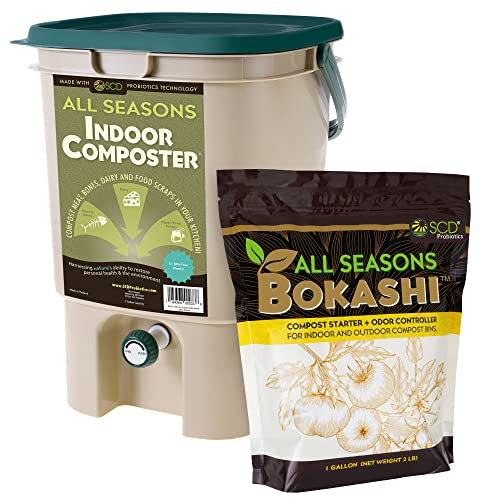Can you compost onions? Will onions stink up the compost pile?
Household kitchen waste is one of the most common compost ingredients added to a traditional compost pile. Onions are one of the most popular vegetables eaten today, so the onion compost question is common.
Onions are compostable, but there are certain things to consider because onions are acidic. There are many things to consider, like cooked onions, moldy onions, the skin and peelings, diseased onions and more.
In this article, I’ll cover how to compost onions, along with the various types and preparation methods.
Can You Compost Onions?
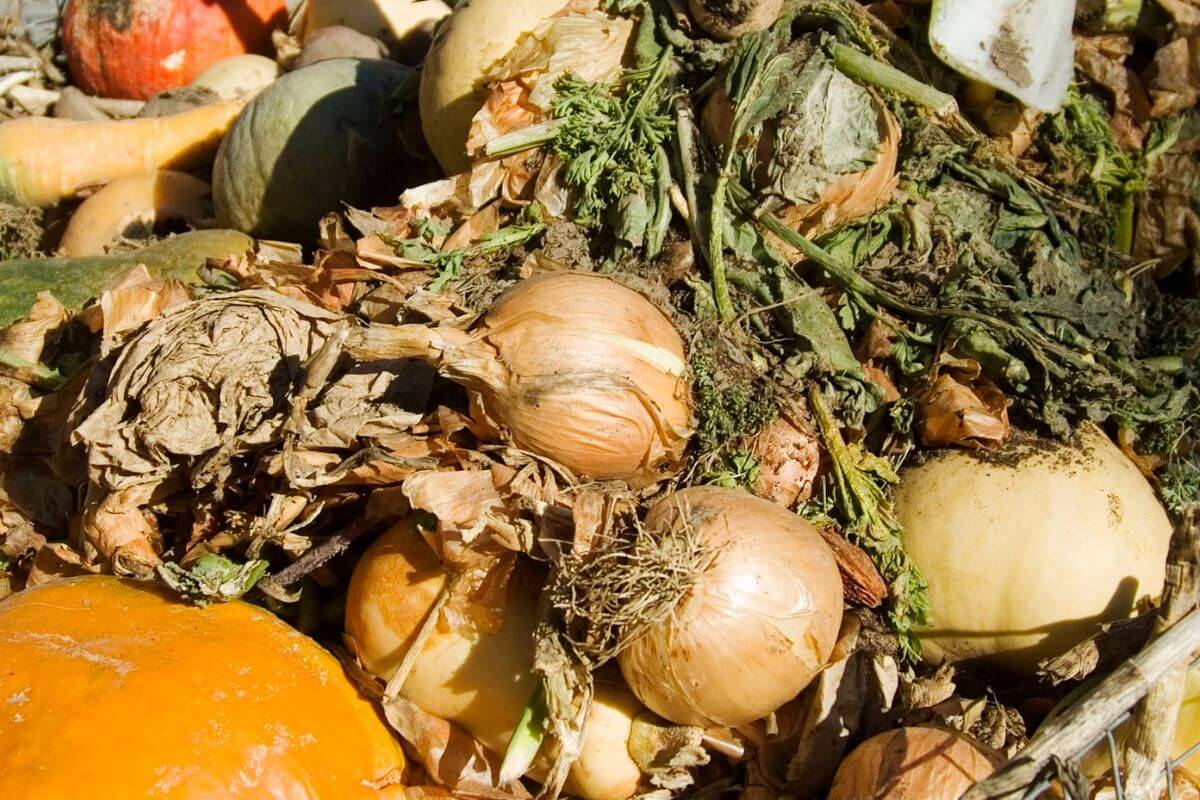
Some people will advise against composting onions. The reasoning behind this is that onions have a low pH, making them acidic. It is also said that onions can have a negative effect on the helpful bacteria that live in your compost.
Despite this train of thought, most gardeners successfully compost onions with no issues. Eggshells and other calcium-based organic materials can be added with onions to balance out the acidity if you are composting a lot of onions at one time.
As long as you compost them correctly, you can add onion scraps to any type of composter without any adverse effects.
Strong smells can be an issue when composting onions, as the odor of onions intensifies when the onions rot down during the decomposition process.
This bad smell can be combatted by burying onions under other materials and adding plenty of carbon-rich materials, like shredded cardboard, shredded paper, oyster shells, or dry leaves.
As long as you mix the onion into your compost and put at least ten inches of organic material on top of them, smells won’t be an issue.
Can You Compost Onion Peelings and Skins?
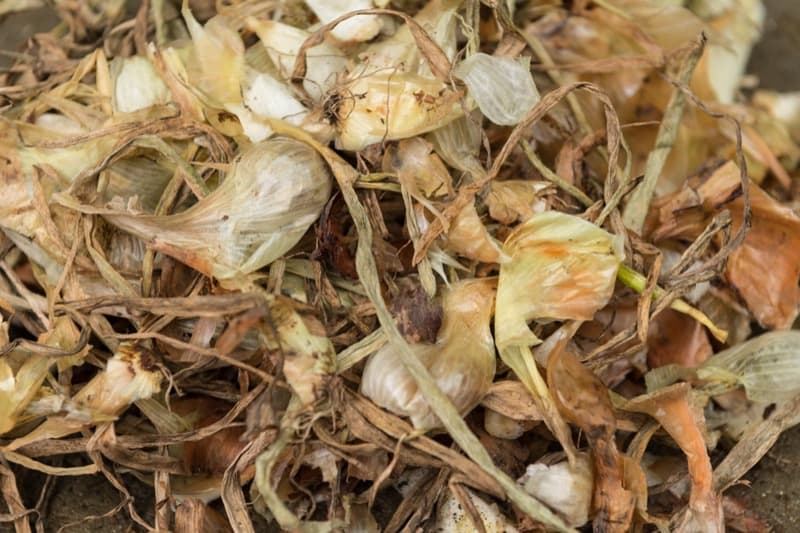
Yes, onion peelings and skins are compostable. Onion skins can be added to the compost, and as they have dried, they won’t produce much smell. Onion skins can just be chucked on the compost without needing to shred them or bury them, which is good news since this is the part that is usually wasted!
However, there are many other things that you can do with onion skins as well. You can add them to bread and soups, infuse them in water for an itch-relieving tonic, or use them to make dye for wood, fabric, or even hair!
Onion peel tea is rich in quercetin, which can reduce issues with allergies, lower blood pressure, help infections, and help you get a good night’s sleep. But onion skins aren’t just great for you; they can also be used in your gardening.
As well as being added to compost, ground onion skins can be used as a rooting agent when mixed with fresh aloe vera. You can make a nutrient-rich liquid fertilizer by soaking the onion skins in water.
With all these options, it seems a shame to just chuck them on the compost heap!
Can You Compost Whole Onions?
Like garlic and potatoes, onions are renowned for springing back to life if left in the cupboard too long. This regrowth is because they are root, bulbous vegetables, and whole onions can sprout in your compost heap.
The main reason you don’t want anything in your compost coming back to life is that they take valuable nutrients in order to grow. Putting in an entire onion will start taking away essential nutrients during the composting process to help itself grow.
The most simple way of preventing onions from sprouting is to cut them up. So, if you need to compost whole onions, then remember to chop them up first. Chopping up onions not only stops them from sprouting but also helps the onion break down quicker.
Can You Compost Moldy Onions?
Moldy onions are absolutely fine to add to your compost as they are already on the way to becoming compost. Composting is the process of breaking down organic matter, so mold forming on any vegetable scraps is often the first step in the process.
If the moldy onions are whole, then it is still advisable to cut them into small pieces, just in case.
Can You Compost Cooked Onions?
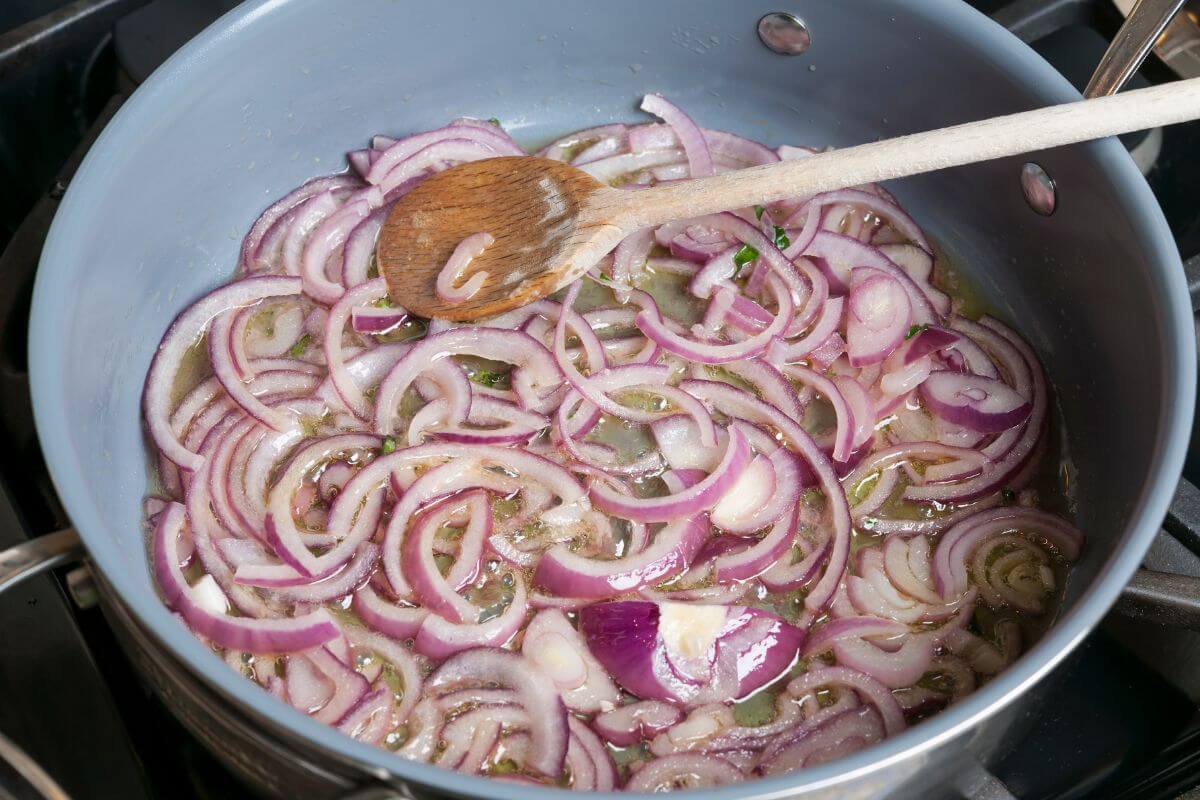
The answer to this question will depend on your method of composting. When using traditional composting methods, it is often advisable to leave out any cooked vegetables like onions.
While the onions themselves aren’t the problem – in fact, they rot down pretty quickly – any fats or sauces that the onions may have soaked up during the cooking process can attract rats and other unwanted critters into your compost.
- Related articles: Keep Rats Away from Vegetable Garden and Keeping Animals Out of Garden
That being said, boiled or steamed onions will be absolutely fine to add to your compost as they won’t be contaminated by anything that might attract pests and uninvited guests.
There are compost systems that will handle fried onions. EMO composters (like a Bokashi bin), electric compost machines, and the Compot system will all be fine for cooked onions, no matter what you have cooked them in.
Avoid Diseased Onions
Again, this depends on the method of composting. To effectively kill pathogens, your compost will need to reach temperatures of 150-160 degrees Fahrenheit for up to four days.
With most methods of composting, you won’t be able to guarantee that your compost will reach these temperatures consistently. The good news is that you can burn diseased onions and add the ashes to your compost, but be sure to use untreated wood to burn them.
Unless you’re able to burn the diseased onions or your compost pile reaches 150-160°F, you shouldn’t add onions with leaf blight, white rot, or onion mildew. This is the same for any diseased plants that you may have and is considering whether to add them to your compost pile.
Worm Composting With Onions
Worm composting – or vermicomposting – is becoming more popular as an educational and economical way to break down food waste.
However, worms like a neutral pH and the acidic nature of onions can cause issues. Also, the strong smell released by raw onions can irritate the worm’s breathing system. As they breathe the noxious smells through their skin, this can turn into a pretty big problem.
General Tips for Composting Onions
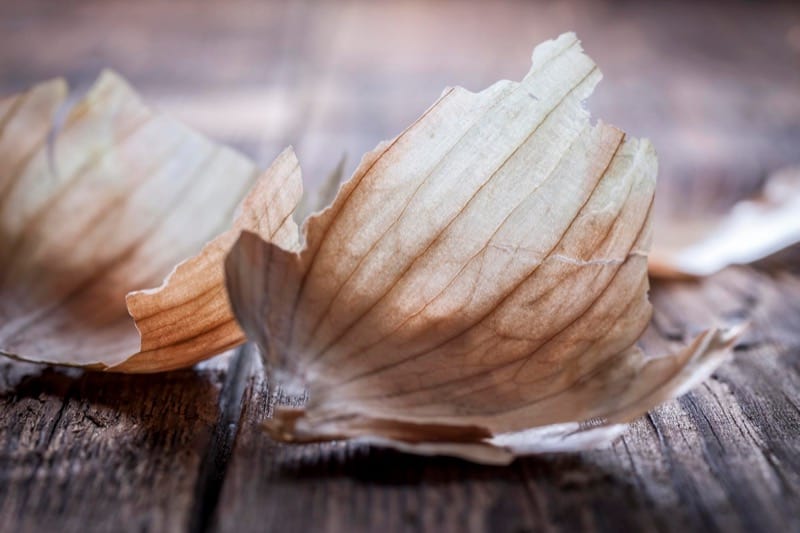
When composting onions, there are some general tips that apply regardless of how you choose to do it.
These rules apply to any type of onion waste, including brown, red, and spring onions.
- Don’t add excessive amounts of onions at once.
- Chop up whole onions as they have a tendency to sprout.
- Cover onions in a layer of brown material to combat bad odors.
- Avoid composting onions cooked with fats, oils, or sauces. (Unless you have a suitable composting system)
- Do not use onions in vermicomposting.
Composting Onions Final Thought
Composting onions is much like composting any other root vegetable. As long as you follow common composting sense, you shouldn’t ever have an issue composting onions.
Unless you are particularly forgetful with the onions in your refrigerator or pantry, you will probably only be composting the onion skin and root end.
However, as well as the many uses of the onion skin, you can also use the root part to regrow onions! By placing the onion piece root-down in damp soil, it is entirely possible to regrow the onion bulb. So really, the question shouldn’t be “Can You Compost Onions,” but instead should be “Why Are You Composting Onions!”
Check out these other articles on composting:


